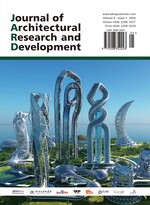Abstract
This paper investigates the design essence of Chinese classical private gardens, integrating their design elements and fundamental principles. It systematically analyzes the unique characteristics and differences among classical private gardens in the Northern, Jiangnan, and Lingnan regions. The study examines nine classical private gardens from Northern China, Jiangnan, and Lingnan by utilizing the advanced tool of principal component cluster analysis. Based on literature analysis and field research, 273 variables were selected for principal component analysis, from which four components with higher contribution rates were chosen for further study. Subsequently, we employed clustering analysis techniques to compare the differences among the three types of gardens. The results reveal that the first principal component effectively highlights the differences between Jiangnan and Lingnan private gardens. The second principal component serves as the key to defining the types of Northern private gardens and distinguishing them from the other two types, and the third principal component indicates that Lingnan private gardens can be categorized into two distinct types as well.
References
Cai ZJ, 2011, A Brief Discussion on the Convergence of Classical Chinese Garden Architecture and Ancient Painting Art. Popular Literature and Art, 2011(18): 291–293.
Liu Y, Li SH, 2008, Research on the Types and Characteristics of Land Use in the Old Summer Palace. Chinese Landscape Architecture, 2008(03): 52–56.
Zhang QH, Zhang SF, 2019, Progress in Modern Garden Research in the Yangtze River Delta Based on Big Data Statistics. Landscape Architecture, 2019(07): 2–7.
Xu ML, 2018, “Spatial Fuzziness” and “Spatial Articulation”, thesis, Tianjin University.
Yang J, 2012, The Impact of Agricultural Science and Technology Application on Agricultural Modernization in Shaanxi Province, thesis, Northwest A & F University.
Liu L, 2012, Competitiveness Evaluation of Zhengzhou’s Regional Financial Center. Financial Theory and Practice, 2012(03): 40–45.
Huang X, 2007, Theoretical Research and Empirical Analysis of Major Cities’ Competitiveness in Jilin Province, thesis, Northeast Normal University.
Liu F, Yu Z, Liu XT, 2009, Analysis of Urban Competitiveness in Economically Backward Regions: A Case Study of Urban Agglomeration along Huaihe River. Modern Urban Research, 24(08): 90–95.
Su Q, Yu HJ, Xu XY, et al., 2011, Hydrochemical Characteristics of Underground Brine in the Coastal Plain on the South Bank of Laizhou Bay. Advances in Marine Science, 29(02): 163–169.
Li YS, Zhu HM, Liu Q, et al., 2012, Research on Land Health Evaluation in Changsha Based on Principal Component Analysis. Agricultural Science and Technology Management, 31(05): 12–16.
Gan PJ, 2014, Evaluation and Countermeasures for the Sustainable Economic Development of the Qaidam Basin, thesis, Qinghai University.
Lu ZY, Zheng JY, Sun TS, 2015, Study on Regional Differences in Urbanization Levels Based on Principal Component and Cluster Analysis: A Case Study of 11 Prefectural Cities in Shanxi Province. Journal of Shanxi Normal University (Natural Science Edition), 29(01): 113–118.
Yan DF, 2012, The Synergistic Succession Mechanism of Vegetation and Soil Under Different Vegetation Restoration Measures in the Low Hill Region of the Taihang Mountain, thesis, Henan Agricultural University.
Fang L, 2013, Research on Evaluating Low-Carbon Economic Development Level in the Upper Yangtze River Region, thesis, Chongqing Technology and Business University.
Han YJ, 2009, Research on Urban Competitiveness Evaluation in Hebei Province, thesis, Yanshan University.
Yu QG, 2002, Comparative Study of Comprehensive Urban Competitiveness in the Yangtze River Delta and Strategic Analysis of Suzhou’s Development, thesis, Suzhou University.
Liu LL, 2011, A Study on Residents’ Perceptions of the Impact of the 2010 World Expo in Shanghai, thesis, Shanghai Normal University.
